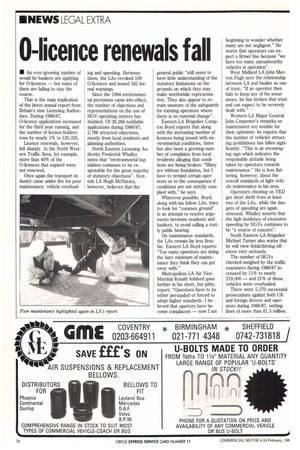0-licence renewals fall
Page 20

If you've noticed an error in this article please click here to report it so we can fix it.
• An ever-growing number of would be hauliers are applying for 0-licences — but many of them are failing to stay the course.
That is the main implication of the latest annual report from Britain's nine Licensing Authorities. During 1986/87, 0-licence applications increased for the third year running, and the number of licence-holders rose by nearly 1% to 130,335.
Licence renewals, however, fell sharply. In the North Western Traffic Area, for example, more than 40% of the 0-licences that expired were not renewed.
Once again the transport industry came under fire for poor maintenance, vehicle overload ing and speeding. Between them, the LAs revoked 109 0-licences and issued 342 formal warnings.
Since the 1984 environmental provisions came into effect, the number of objections and representations on the use of HGV operating centres has doubled. Of 38,266 notifiable applications during 1986/87, 2,788 attracted objections, mostly from local residents and planning authorities.
North Eastern Licensing Authority Frederick Whalley notes that "environmental legislation continues to be responsible for the great majority of statutory objections". Scottish LA Hugh McNarara, however, believes that the general public "still seem to have little understanding of the statutory limitations on the grounds on which they may make worthwhile representation. They also appear to remain unaware of the safeguards for existing operators where there is no material change", Eastern LA Brigadier Compton Boyd reports that along with the increasing number of licences being issued with environmental conditions, there has also been a growing number of complaints from local residents alleging that conditions are being broken: "Many are without foundation, but I have to remind certain operators as to the consequence if conditions are not strictly complied with," he says.
Wherever possible, Boyd, along with his fellow LAs, tries to look for "common ground" in an attempt to resolve arguments between residents and hauliers, to avoid calling a costly public hearing.
On maintenance standards, the LAs remain far less flexible. Eastern LA Boyd reports: "Too many operators are doing the bare minimum of maintenance they think they can get away with."
Metropolitan LA Air ViceMarshal Ronald Ashford goes further in his short, but pithy, report: "Operators have to be either persuaded or forced to adopt higher standards. I believed that opertors have become complacent — now I am beginning to wonder whether many are not negligent" He warns that operators can expect a firmer line because "we have too many unroadworthy vehicles in operation".
West Midland LA John Mervyn Pugh sees the relationship between LA and haulier as one of trust: "If an operator then fails to keep any of his assurances, he has broken that trust and can expect to be severely dealt with."
Western LA Major General John Carpenter's remarks on maintenance are notable for their optimism: he reports that the number of vehicles attracting prohibitions has fallen significantly. "This is an encouraging sign which indicates the responsible attitude being taken by operators towards maintenance." He is less flattering, however, about the overall standards of light vehicle maintenance in his area.
Operators cheating on VED get short shrift from at least two of the LAs, while the dangers of speeding are again stressed. Whalley asserts that the high incidence of excessive speeding by HGVs continues to be "a source of concern".
South Eastern LA Brigadier Michael Turner also warns that he will view drink/driving offences very seriously.
The number of HGVs checked-weighed by the traffic examiners during 1986/87 increased by 11% to nearly 219,000 — and 21% of those vehicles were overloaded.
There were 5,270 successful prosecutions against both UK and foreign drivers and operators during 1986/87, netting fines of more than £1.5 million.




















































































